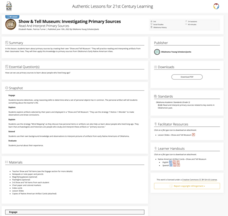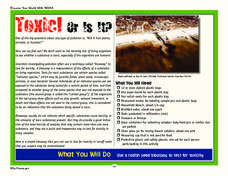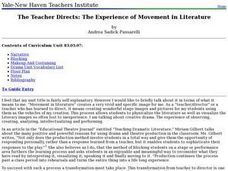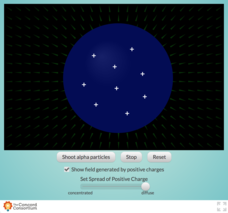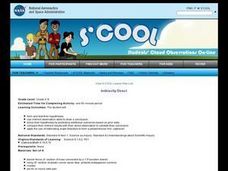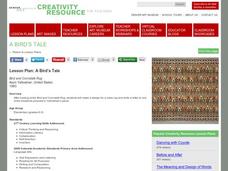Curated OER
The Five Senses - Observation, Experimentation, Prediction, and Categorization.
First graders engage in this creative and well-designed lesson. They rotate through five learning stations, each devoted to one of the senses. They practice observation, experimentation, prediction, and categorization.
Curated OER
Giving Directions
First graders view the object on their desk observing the colors, patterns, and the way the object is put together but not touching it. They then write on paper the directions they would give someone so that they would be able to build...
Curated OER
Following Directions
Young scholars explore the way astronauts practice and train to improve their efficiency in completing challenging tasks. They time and graph how long it takes to follow a list of directions. Also, they determine how practice and...
Curated OER
Finding Wind Direction
Students identify the wind direction. In this weather lesson plan, students use a weather vane to find the wind direction. Students complete a worksheet.
Curated OER
Plant Parts
Little ones identify the parts of a plant and practice following directions at the same time. They color each part of the flowering plant the color indicated on the sheet. Roots are brown, leaves are green, the flower is red, and the...
Norfork School District
Habits of Mind
Why do artists create? To solve a problem, of course. Young artists work individually and then in groups to create observational, imaginative, and narrative drawings in response to an assignment that requires them to employ all 16 Habits...
Curriculum Corner
I See a School
Give observational and writing skills a boost with a worksheet that takes scholars on a sight-seeing journey around the school. Learners read sentences and color a corresponding picture, then write their own observational sentence and...
K20 LEARN
Show and Tell Museum - Investigating Primary Sources: Read and Interpret Primary Sources
Scholars become detectives in a instructional activity that focuses on primary sources. Learners practice their observational skills by examining the teacher's artifact and visiting the Show and Tell Museum that highlihgts items from...
PBS
Explore Art and Movement Inspired by Jacob Lawrence’s Migration Series
Panel 58 from Jacob Lawrence's "Migration Series" of paintings provides middle schoolers with an opportunity to sharpen their observation and analytical skills. After engaging in a warm-up activity that introduces the concepts of...
NOAA
Toxic! Or Is It?
Super scientists tests the toxicity of water using radish seed bioassays. Over the course of five days, scholars observe the germination process of several radish seeds, looking closely at their roots to determine the level of toxins...
Academy of American Poets
Teach This Poem: "Putting in the Seed" by Robert Frost
Young botanists dig into a instructional activity that has them planting lima bean seeds and observing their growth. They compare their experience to that of the speaker in Robert Frost's poem, "Putting in the Seed."
Alabama Learning Exchange
Observation of Yeast Growth
Middle schoolers build an apparatus to look at how yeast cells grow by converting food to energy. They observe yeast both with and without food and see how yeast produces carbon dioxide.
Curated OER
The Teacher Directs: The Experience of Movement in Literature
Experience movement in literature. High schoolers are introduced to new vocabulary related to drama and theatre. In groups, they use a piece of literature and develop their own skit to act out in front of the class. As a class, they are...
Howard Hughes Medical Institute
Winogradsky Columns: Microbial Ecology in the Classroom
Winogradsky columns are ideal for observing the role of bacteria and other microorganisms in an ecosystem. This student activity guide is complete with data tables for observations and analysis questions for processing what was observed....
Climate Research Facility
Ocean Currents
Young scientists investigate the effects of heating a beaker of ice water by dropping dye into the water and observing how the color circulates.
Concord Consortium
Concentrating Charge and Electric Fields
How did Rutherford determine that the nucleus was the center of an atom? Take a look inside the famous Gold Foil Experiment with an interesting interactive. Learners fire a beam of alpha particles at a nucleus containing variable...
Read Works
American Government Preamble to the United States Constitution
Observe Constitution Day with a worksheet that delves deep into the who, what, why, when, where, and how of the U.S. Constitution. Scholars read a short informational text then answer 10 questions—short answer and multiple choice.
Royal Society of Chemistry
Equilibria—Gifted and Talented Chemistry
Teaching is a balancing act! Keep things on an even keel with a comprehensive equilibrium lesson plan. The resource covers reversible and irreversible reactions, Le Chatelier's Principle, and the industrial applications of equilibrium...
Curated OER
Graphs and Direct Variation
Students solve problems with direct variation. In this algebra lesson, students analyze graphs to figure out the direct variation of a line. They observe the slopes based the steepness of the lines.
Curated OER
Heating Up: Direct and Indirect Sunlight
Students, by conducting simulations, explore the effects of direct and indirect sunlight on heating of the Earth.
Baylor College
Animals' Needs
Explore the wonderful world of earthworms as your class learns about the requirements of animal life. After building soda bottle terrariums, students observe worms over the course of a couple weeks, building an understanding that all...
Baylor College
Needs of Plants
What better way to learn about plant life than by creating a class garden? Young botanists start with a brief discussion about radishes before planting seeds and watching them grow. To determine the importance of water, sunlight, and...
Curated OER
Indirectly Direct
Learners use prior knowledge of angle and lines as they conduct an experiment with a rolling marble to determine the shape of a mystery object located under a metal pie tin.
Curated OER
Lesson Plan: A Bird's Tale
Who wouldn't love to get a letter from a blue bird? Elementary art enthusiasts analyze the social and historical context of Ason Yellowhair's Navajo piece, Bird and Cornstalk Rug. They examine the construction and images on the rug...
Other popular searches
- Euglena Direct Observation
- Eugenia Direct Observation
- Euglenda Direct Observation
- Glenda Direct Observation
- What Is Direct Observation









